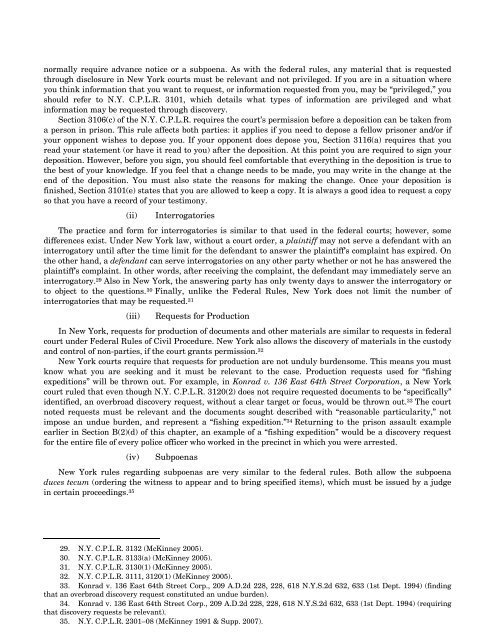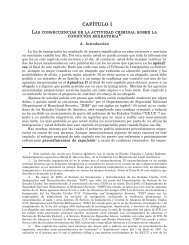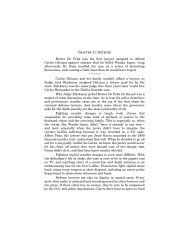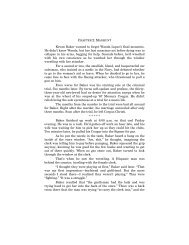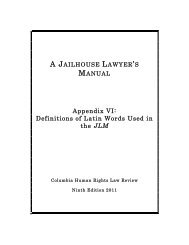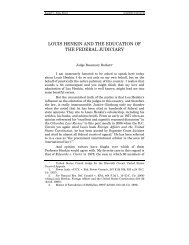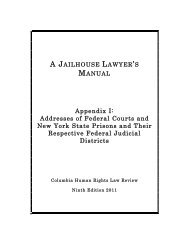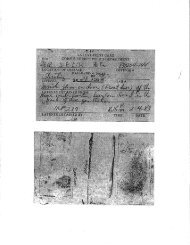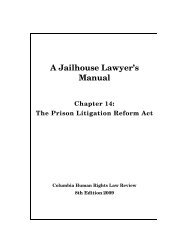A Jailhouse Lawyer's Manual - Columbia Law School
A Jailhouse Lawyer's Manual - Columbia Law School
A Jailhouse Lawyer's Manual - Columbia Law School
Create successful ePaper yourself
Turn your PDF publications into a flip-book with our unique Google optimized e-Paper software.
normally require advance notice or a subpoena. As with the federal rules, any material that is requested<br />
through disclosure in New York courts must be relevant and not privileged. If you are in a situation where<br />
you think information that you want to request, or information requested from you, may be “privileged,” you<br />
should refer to N.Y. C.P.L.R. 3101, which details what types of information are privileged and what<br />
information may be requested through discovery.<br />
Section 3106(c) of the N.Y. C.P.L.R. requires the court’s permission before a deposition can be taken from<br />
a person in prison. This rule affects both parties: it applies if you need to depose a fellow prisoner and/or if<br />
your opponent wishes to depose you. If your opponent does depose you, Section 3116(a) requires that you<br />
read your statement (or have it read to you) after the deposition. At this point you are required to sign your<br />
deposition. However, before you sign, you should feel comfortable that everything in the deposition is true to<br />
the best of your knowledge. If you feel that a change needs to be made, you may write in the change at the<br />
end of the deposition. You must also state the reasons for making the change. Once your deposition is<br />
finished, Section 3101(e) states that you are allowed to keep a copy. It is always a good idea to request a copy<br />
so that you have a record of your testimony.<br />
(ii) Interrogatories<br />
The practice and form for interrogatories is similar to that used in the federal courts; however, some<br />
differences exist. Under New York law, without a court order, a plaintiff may not serve a defendant with an<br />
interrogatory until after the time limit for the defendant to answer the plaintiff’s complaint has expired. On<br />
the other hand, a defendant can serve interrogatories on any other party whether or not he has answered the<br />
plaintiff’s complaint. In other words, after receiving the complaint, the defendant may immediately serve an<br />
interrogatory. 29 Also in New York, the answering party has only twenty days to answer the interrogatory or<br />
to object to the questions. 30 Finally, unlike the Federal Rules, New York does not limit the number of<br />
interrogatories that may be requested. 31<br />
(iii) Requests for Production<br />
In New York, requests for production of documents and other materials are similar to requests in federal<br />
court under Federal Rules of Civil Procedure. New York also allows the discovery of materials in the custody<br />
and control of non-parties, if the court grants permission. 32<br />
New York courts require that requests for production are not unduly burdensome. This means you must<br />
know what you are seeking and it must be relevant to the case. Production requests used for “fishing<br />
expeditions” will be thrown out. For example, in Konrad v. 136 East 64th Street Corporation, a New York<br />
court ruled that even though N.Y. C.P.L.R. 3120(2) does not require requested documents to be “specifically”<br />
identified, an overbroad discovery request, without a clear target or focus, would be thrown out. 33 The court<br />
noted requests must be relevant and the documents sought described with “reasonable particularity,” not<br />
impose an undue burden, and represent a “fishing expedition.” 34 Returning to the prison assault example<br />
earlier in Section B(2)(d) of this chapter, an example of a “fishing expedition” would be a discovery request<br />
for the entire file of every police officer who worked in the precinct in which you were arrested.<br />
(iv) Subpoenas<br />
New York rules regarding subpoenas are very similar to the federal rules. Both allow the subpoena<br />
duces tecum (ordering the witness to appear and to bring specified items), which must be issued by a judge<br />
in certain proceedings. 35<br />
29. N.Y. C.P.L.R. 3132 (McKinney 2005).<br />
30. N.Y. C.P.L.R. 3133(a) (McKinney 2005).<br />
31. N.Y. C.P.L.R. 3130(1) (McKinney 2005).<br />
32. N.Y. C.P.L.R. 3111, 3120(1) (McKinney 2005).<br />
33. Konrad v. 136 East 64th Street Corp., 209 A.D.2d 228, 228, 618 N.Y.S.2d 632, 633 (1st Dept. 1994) (finding<br />
that an overbroad discovery request constituted an undue burden).<br />
34. Konrad v. 136 East 64th Street Corp., 209 A.D.2d 228, 228, 618 N.Y.S.2d 632, 633 (1st Dept. 1994) (requiring<br />
that discovery requests be relevant).<br />
35. N.Y. C.P.L.R. 2301–08 (McKinney 1991 & Supp. 2007).


